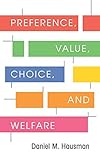Preferences, value, choice, and welfare [Texte imprimé] / Daniel M. Hausman, Monographie imprimée
Language: anglais.Country: EtatsUnis.Publication : New York : Cambridge University Press, cop. 2012Description: 1 vol. (XIV-153 p.) : ill. ; 24 cmISBN: 978-1-10-701543-2; 1-10-701543-X; 978-1-10-769512-2; 1-10-769512-0.Dewey: 658.8/343, 23Contents note: 1. Preferences, comparative evaluations, ad reasons Part I. Preferences in Positive Economics: 2. Preference axioms and their implications; 3. Revealed-preference theory; 4. Preferences, decision theory, and consequentialism; 5. Game theory and consequentialism; 6. Constraints and counterpreferential choice Part II. Preferences, Welfare, and Normative Economics: 7. Preference satisfaction and welfare; 8. Preferences in welfare economics Part III. Psychology, Rational Evaluation, and Preference Formation: 9. The psychology of choice; 10. Constructing preferences; 11. Conclusions Abstract: "This book is about preferences, principally as they figure in economics. It also explores their uses in everyday language and action, how they are understood in psychology and how they figure in philosophical reflection on action and morality. The book clarifies and for the most part defends the way in which economists invoke preferences to explain, predict and assess behavior and outcomes. Hausman argues, however, that the predictions and explanations economists offer rely on theories of preference formation that are in need of further development, and he criticizes attempts to define welfare in terms of preferences and to define preferences in terms of choices or self-interest. The analysis clarifies the relations between rational choice theory and philosophical accounts of human action. The book also assembles the materials out of which models of preference formation and modification can be constructed, and it comments on how reason and emotion shape preferences"--Provided by publisher; "This book is about preferences, principally as they figure in economics. It also explores their uses in everyday language and action, how they are understood in psychology and how they figure in philosophical reflection on action and morality. The book clarifies and for the most part defends the way in which economists invoke preferences to explain, predict and assess behavior and outcomes. Hausman argues, however, that the predictions and explanations economists offer rely on theories of preference formation that are in need of further development, and he criticizes attempts to define welfare in terms of preferences and to define preferences in terms of choices or self-interest. The analysis clarifies the relations between rational choice theory and philosophical accounts of human action. The book also assembles the materials out of which models of preference formation and modification can be constructed, and it comments on how reason and emotion shape preferences"--Provided by publisher.Bibliography: Bibliogr. p. 139-158. Index.Subject - Topical Name: Choix rationnels, Théorie des | Choix (philosophie) | Valeur | Consommateurs, Comportement| Item type | Home library | Collection | Call number | Status | Date due | Barcode | Item holds |
|---|---|---|---|---|---|---|---|
| Prêt normal | BU Chevreul 2ème étage : Economie | Economie et gestion | 658.8 HAU (Browse shelf (Opens below)) | Available | 0379110007 |
Bibliogr. p. 139-158. Index
1. Preferences, comparative evaluations, ad reasons Part I. Preferences in Positive Economics: 2. Preference axioms and their implications; 3. Revealed-preference theory; 4. Preferences, decision theory, and consequentialism; 5. Game theory and consequentialism; 6. Constraints and counterpreferential choice Part II. Preferences, Welfare, and Normative Economics: 7. Preference satisfaction and welfare; 8. Preferences in welfare economics Part III. Psychology, Rational Evaluation, and Preference Formation: 9. The psychology of choice; 10. Constructing preferences; 11. Conclusions
"This book is about preferences, principally as they figure in economics. It also explores their uses in everyday language and action, how they are understood in psychology and how they figure in philosophical reflection on action and morality. The book clarifies and for the most part defends the way in which economists invoke preferences to explain, predict and assess behavior and outcomes. Hausman argues, however, that the predictions and explanations economists offer rely on theories of preference formation that are in need of further development, and he criticizes attempts to define welfare in terms of preferences and to define preferences in terms of choices or self-interest. The analysis clarifies the relations between rational choice theory and philosophical accounts of human action. The book also assembles the materials out of which models of preference formation and modification can be constructed, and it comments on how reason and emotion shape preferences"--Provided by publisher
"This book is about preferences, principally as they figure in economics. It also explores their uses in everyday language and action, how they are understood in psychology and how they figure in philosophical reflection on action and morality. The book clarifies and for the most part defends the way in which economists invoke preferences to explain, predict and assess behavior and outcomes. Hausman argues, however, that the predictions and explanations economists offer rely on theories of preference formation that are in need of further development, and he criticizes attempts to define welfare in terms of preferences and to define preferences in terms of choices or self-interest. The analysis clarifies the relations between rational choice theory and philosophical accounts of human action. The book also assembles the materials out of which models of preference formation and modification can be constructed, and it comments on how reason and emotion shape preferences"--Provided by publisher


